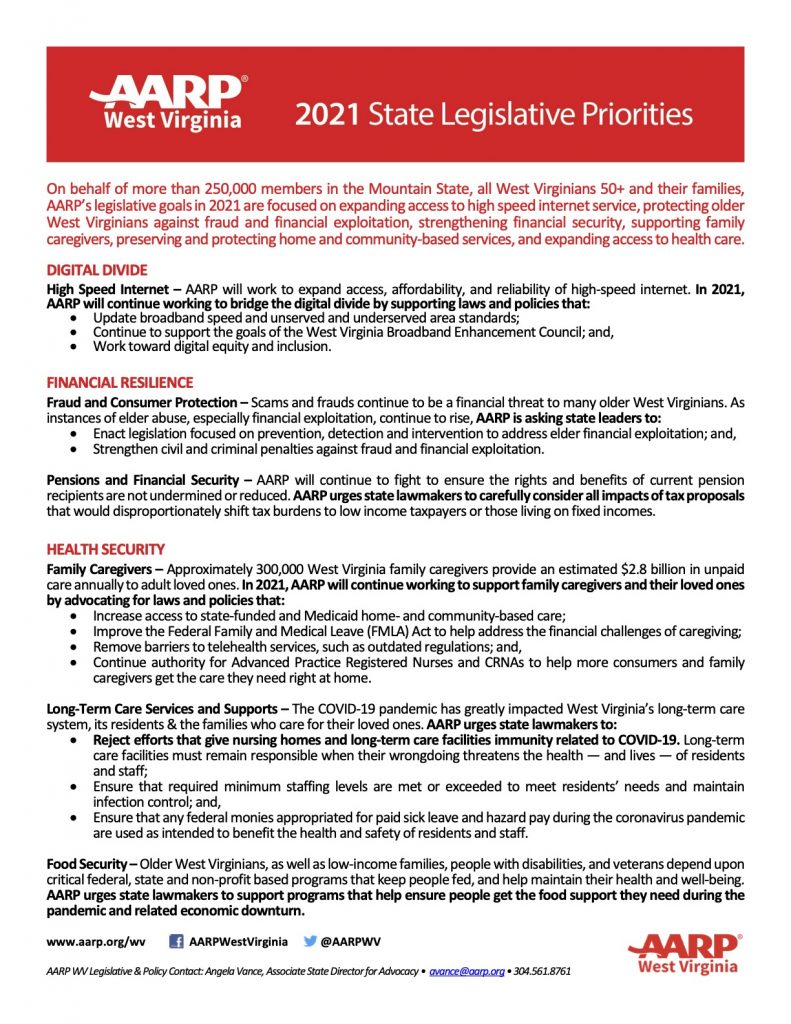VIDEO FEATURE: Expansion of high speed internet, caregiving, long-term care, health care access among session priority issues
CHARLESTON, W.Va. — AARP West Virginia state leaders today detailed the organization’s legislative agenda for the 2021 West Virginia Legislature.
The organization, which represents more than a quarter-million older West Virginians, is focused on legislative action addressing challenges with high speed internet service access; protecting older West Virginians and their families against abuse, fraud and financial exploitation; strengthening financial security, supporting family caregivers; preserving and protecting home and community-based services; and, expanding access to health care.
AARP West Virginia staff and volunteers are working closely with state leaders on the passage of legislation affecting West Virginians 50-plus, which includes:
DIGITAL DIVIDE
High Speed Internet – AARP will work to expand access, affordability, and reliability of high-speed internet. In 2021, AARP will continue working to bridge the digital divide by supporting laws and policies that:
• Update broadband speed and unserved and underserved area standards;
• Continue to support the goals of the West Virginia Broadband Enhancement Council; and,
• Work toward digital equity and inclusion.
HEALTH SECURITY
Long-Term Care Services and Supports – The COVID-19 pandemic has greatly impacted West Virginia’s long-term care system, its residents & the families who care for their loved ones. AARP urges state lawmakers to:
• Reject efforts that give nursing homes and long-term care facilities immunity related to
COVID-19. While West Virginia’s state-level and industry response to this pandemic has
exceeded that of the rest of the country, tragically nearly 700 West Virginia nursing home
residents and staff have lost their lives to COVID-19 since the beginning of the pandemic.
Long-term care facilities must remain responsible when their wrongdoing threatens the health — and lives — of residents and staff;
• Ensure that required minimum staffing levels are met or exceeded to meet residents’ needs and maintain infection control; and,
• Ensure that any federal monies appropriated for paid sick leave and hazard pay during the coronavirus pandemic are used as intended to benefit the health and safety of residents and staff.
Family Caregivers – Approximately 300,000 West Virginia family caregivers provide an estimated $2.8 billion in unpaid care annually to adult loved ones. In 2021, AARP will continue working to support family caregivers and their loved ones by advocating for laws and policies that:
• Increase access to state-funded and Medicaid home- and community-based care;
• Improve the Federal Family and Medical Leave (FMLA) Act to help address the financial
challenges of caregiving;
• Remove barriers to telehealth services, such as outdated regulations; and,
• Continue authority for Advanced Practice Registered Nurses and CRNAs to help more
consumers and family caregivers get the care they need right at home.
Food Security – Older West Virginians, as well as low-income families, people with disabilities, and veterans depend upon critical federal, state and non-profit based programs that keep people fed, and help maintain their health and well-being. AARP urges state lawmakers to support programs that help ensure people get the food support they need during the pandemic and related economic downturn.
FINANCIAL RESILIENCE
Fraud and Consumer Protection – Scams and frauds continue to be a financial threat to many older West Virginians. As instances of elder abuse, especially financial exploitation, continue to rise, AARP is asking state leaders to:
• Enact legislation focused on prevention, detection and intervention to address elder financial exploitation; and,
• Strengthen civil and criminal penalties against fraud and financial exploitation.
Pensions and Financial Security – AARP will continue to fight to ensure the rights and benefits of current pension recipients are not undermined or reduced. AARP urges state lawmakers to carefully consider all impacts of tax proposals that would disproportionately shift tax burdens to low income taxpayers or those living on fixed incomes.
“AARP’s state advocacy agenda reflects the organization’s strong commitment to find bipartisan solutions that provide critical support for West Virginia’s nearly 300,000 family caregivers, and protect the health and safety of older West Virginians,” said AARP West Virginia State President Jane Marks.
For the latest updates on AARP’s state advocacy work at the West Virginia Legislature, follow AARP West Virginia on Facebook and on Twitter @AARPWV.
The 60-day regular session of the West Virginia Legislature concludes on Saturday, April 10.
AARP is the nation’s largest nonprofit, nonpartisan organization dedicated to empowering people 50 and older to choose how they live as they age. With a nationwide presence and nearly 38 million members, AARP strengthens communities and advocates for what matters most to families: health security, financial stability and personal fulfillment. As a trusted source for news and information, AARP produces the nation’s largest circulation publications, AARP The Magazine and AARP Bulletin.
To learn more, visit www.aarp.org or follow @AARP and @AARPadvocates on social media.

